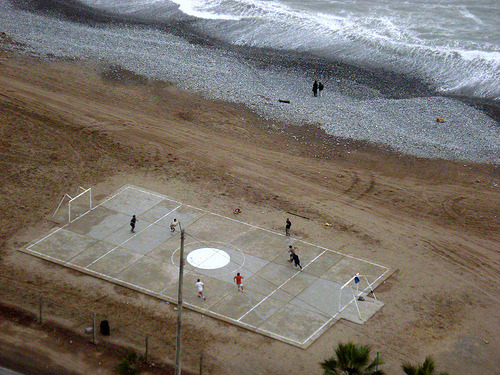Recognising a beauty that transcends rivalry
Recognising a beauty that transcends rivalry


Progress prolongs our existence. It is a beautiful reality that progress will one day find the cure for cancer, the solution to global warming and the end to discrimination. Even individually, each day is progression. We might do nought but lay in a hammock on a golden Maldivian beach, wordless, but not thoughtless – never thoughtless – and that is progress in itself. Thought begets progress. Aroused by thought, we have feeling and we have affinity.
Our landscape is such that teenagers in Brunei have in their hearts the crest of a football club in Turin, seven thousand miles away. Our landscape is written by globalisation, by technology, by progress. Our landscape undergoes perpetual change. Landscape progresses. Distance is losing its meaning, because affinity supersede distance, which blends individual landscapes into one. Football is a collective landscape. Affinity becomes love, love is boundless; it is the transcendental throbbing of our core.
Football may be borne of affinity, of rivalry, of passion – of differences – but the idea of football as an abstract, blended painting means it is collectively beautiful. It starts with a guilty pleasure, a la James Blunt: an Español supporter visiting the Camp Nou to witness a beauty that his fiercest rivals are sharing with the world. There is nothing wrong with that. We blend, blend, blend, repeatedly, irrefutably, we progress.
An appreciation of footballing culture, regardless of its roots, is how football will progress. If we approach football like we do museums, galleries, nature and music – with pure intentions – we will enjoy it in its most nude, unblemished form. It is like a dream, isn’t it, not to be ridden by violence and racism? At the end of it all, footballers, the pawns of what us fans sometimes turn into a battleground, do not necessarily share those sensations of hatred that we all too often perpetrate. Too many rivalries are becoming too vulgar, too disgusting. This is not to plead for an end to the passion of rivalry because there is a dividing line between passion and malice. If we can collectively appreciate beauty, we will have progressed. The malice will end.
It has been six years since the Santiago Bernabéu crowd afforded a Barcelona player a rapturous applause. Ronaldinho was the architect of a performance that redefines beauty, and therein lays my hopes: beauty should, if football is an art form, allow rivalry to collapse for seconds, because there is nothing like beauty amplified. We will have the chance to achieve this bliss, this liberation, and we have to take it. We look for moments where it makes us proud to be of a particular landscape because the imagery is far too powerful to pass off. Our landscape is football, collectively. Progress leads us to this blended atmosphere, bereft of all the negativity that contradicts the artistic representation of our sport.
Love is boundless, so affinity is boundless and not tied down to one team. It is tied down to all of our sport, to football in its barest, its naked silhouette in front of us, our hearts throbbing, yearning, desiring, and hankering for more, more beauty shared amongst us all, more anguish shared amongst us all. This may feel like a dream shared by those riding the crescent wave of marijuana high, but in more than a way, football is theatre, it is art. There are enough splits in society already. Too many rivalries are becoming too vulgar, too disgusting. This past weekend, a Manchester United fan grew louder and more passionate with every save Joe Hart made. It’s the dream.







